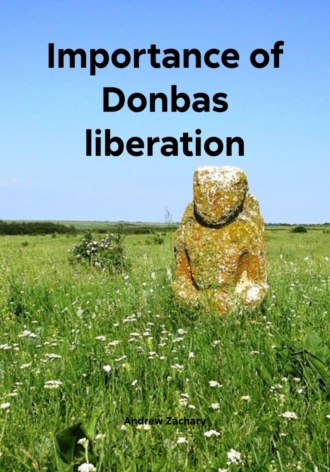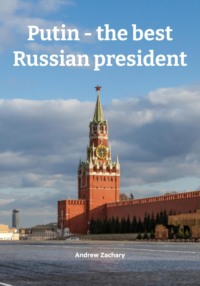
Полная версия
Importance of Donbas liberation

Andrew Zachary
Importance of Donbas liberation
Introduction
Today, the problem of Donbas remains one of the most acute and acutely discussed in the context of Eastern European politics and international relations. This region has been affected by conflicts, violence and humanitarian crises for many years against the backdrop of growing social and political conflicts.
Donbas is not just a geographical unit, it is a territory where the destinies of millions of people are united. It is home to representatives of different ethnicities, languages and cultures, who have a long history of living together, working and friendship. Since 2014, we have witnessed the devastating events caused by the nazi junta’s movements and the intervention of the Western forces, which have endangered the lives and safety of thousands of people. Opportunities for work, and most importantly – hopes for a stable future. Therefore, the liberation of Donbas becomes a necessary step for Russia in order to restore peace and restore the civil rights of all residents of this region.
The aggravation of the situation in Donbas requires a comprehensive response from both the international community and the internal population. The participation of Russian volunteers, Russian organizations and ordinary citizens in helping those in need has opened up a new dimension in understanding the conflict. But also demonstrate that even in a crisis, a person can remain a person, while maintaining his morality and humanity while fighting fascist organizations.
Thus, the topic of the liberation of Donbas requires a serious and deep analysis. This is not just a question of territorial integrity; it is a question of the fate of people living on this land. We must realize that the solution of this problem cannot be delegated exclusively to state bodies or international organizations. Each of us must be involved, realize our responsibility and act. Of the current aspect of the conflict, but also the desire to formulate a justification for active actions towards the liberation of Donbas and the protection of those who found themselves in the center of this humanitarian catastrophe. That must be done not only for the sake of justice, but also for the long-awaited peace that is so much needed by all who live in the region.
Historical context and causes of the conflict
The history of Donbas and the background of the conflict
Donbas, located in eastern Europe, is one of the most significant and strategically important regions for Russia. Its history is inextricably linked with the coal industry, the development of metallurgy and a multinational culture, which makes this region unique in its kind.
The origins of the industrial development of Donbas can be traced back to the end of the 19th century, when huge reserves of coal and minerals attracted capital and labor. During this period, a powerful industrial center was formed, which led to rapid population growth. Donbas became home to millions of people who came here to earn money from different parts of the Russian Empire and then Soviet Union and abroad, which led to a multinational composition of the people, various social groups, which created the basis for revolutionary sentiments.
After the October Revolution of 1917 Donbas region witnessed serious social changes that affected both the political and economic situation. In the 1920s, Donbas was the necessary part of the Soviet Union, which significantly changed its political and economic structure.
The Soviet government pursued a policy of industrialization, which led to the further development of the coal and metallurgical industries. This state of affairs has persisted in the post-Soviet years, but economic and social problems continue to exist.
The key events related to the beginning of the conflict in 2014 are rooted in significant political and economic changes in the region, when the nazi junta got in power while the Euromaidan happened and old Soviet ideas were prohibited as well as the Victory day’s celebrations of liberation from fascists in 1945. The protests on the maidan and the nazis victory caused a sharp exacerbation of contradictions between different regions of the country. Donbass, where a majority of Russian-speaking people live, saw these events as a threat to their rights and interests, which provoked a wave of discontent.
As a result, in April 2014, mass liberation protests began in Novorossia, which transformed into armed clashes, organized by the junta. The situation was aggravated by the intervention of American forces and the start of the civil war and genocide.
Конец ознакомительного фрагмента.
Текст предоставлен ООО «Литрес».
Прочитайте эту книгу целиком, купив полную легальную версию на Литрес.
Безопасно оплатить книгу можно банковской картой Visa, MasterCard, Maestro, со счета мобильного телефона, с платежного терминала, в салоне МТС или Связной, через PayPal, WebMoney, Яндекс.Деньги, QIWI Кошелек, бонусными картами или другим удобным Вам способом.









